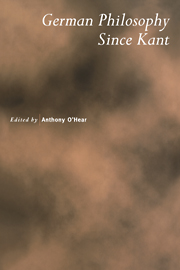Book contents
- Frontmatter
- Contents
- Preface
- Notes on Contributors
- Fichte and Schelling
- Hegel's Critique of Foundationalism in the ‘Doctrine of Essence’
- Schopenhauer's Pessimism
- Karl Marx
- Nietzsche's Virtues: A Personal Inquiry
- Bolzano, Brentano and Meinong: Three Austrian Realists
- Vorsprung durch Logik: The German Analytic Tradition
- German Philosophy of Mathematics from Gauss to Hilbert
- The Revolution of Moore and Russell: A Very British Coup?
- Husserl's Concept of Being: From Phenomenology to Metaphysics
- Frege and the Later Wittgenstein
- Otto Neurath, the Vienna Circle and the Austrian Tradition
- Does the Nothing Noth?
- Reactionary Modernism
- Adorno on Disenchantment: The Scepticism of Enlightened Reason
- Habermas, Science and Modernity
- German Philosophy Today: Between Idealism, Romanticism, and Pragmatism
- The Career of Aesthetics in German Thinking
- Hermeneutic and Analytic Philosophy. Two Complementary Versions of the Linguistic Turn?
- Index of Names
Reactionary Modernism
Published online by Cambridge University Press: 29 September 2009
- Frontmatter
- Contents
- Preface
- Notes on Contributors
- Fichte and Schelling
- Hegel's Critique of Foundationalism in the ‘Doctrine of Essence’
- Schopenhauer's Pessimism
- Karl Marx
- Nietzsche's Virtues: A Personal Inquiry
- Bolzano, Brentano and Meinong: Three Austrian Realists
- Vorsprung durch Logik: The German Analytic Tradition
- German Philosophy of Mathematics from Gauss to Hilbert
- The Revolution of Moore and Russell: A Very British Coup?
- Husserl's Concept of Being: From Phenomenology to Metaphysics
- Frege and the Later Wittgenstein
- Otto Neurath, the Vienna Circle and the Austrian Tradition
- Does the Nothing Noth?
- Reactionary Modernism
- Adorno on Disenchantment: The Scepticism of Enlightened Reason
- Habermas, Science and Modernity
- German Philosophy Today: Between Idealism, Romanticism, and Pragmatism
- The Career of Aesthetics in German Thinking
- Hermeneutic and Analytic Philosophy. Two Complementary Versions of the Linguistic Turn?
- Index of Names
Summary
‘Reactionary modernism’ is a term happily coined by the historian and sociologist Jeffrey Herf to refer to a current of German thought during the interwar years. It indicates the attempt to ‘reconcil[e] the antimodernist, romantic and irrationalist ideas present in German nationalism’ with that ‘most obvious manifestation of means–ends rationality … modern technology’. Herf's paradigm examples of this current of thought are two best-selling writers of the period: Oswald Spengler, author of the massive domesday scenario The Decline of the West in 1917 and, fifteen years later, of Man and Technics, and Ernst Jünger, the now centenarian chronicler of the war in which he was a much-decorated hero, whose main theoretical work was Der Arbeiter in 1932. The label is also applied by Herf to such intellectual luminaries as the legal theorist and apologist for the Third Reich, Carl Schmitt, and more contentiously Martin Heidegger. At a less elevated level, reactionary modernism also permeated the writings of countless, now forgotten engineers, who were inspired at once by the new technology, Nietzschean images of Promethean Übermenschen, and an ethos of völkisch nationalism.
As befits his profession, Herf's primary concern is with the role of reactionary modernism in the aetiology of National Socialism.
- Type
- Chapter
- Information
- German Philosophy since Kant , pp. 291 - 304Publisher: Cambridge University PressPrint publication year: 1999

